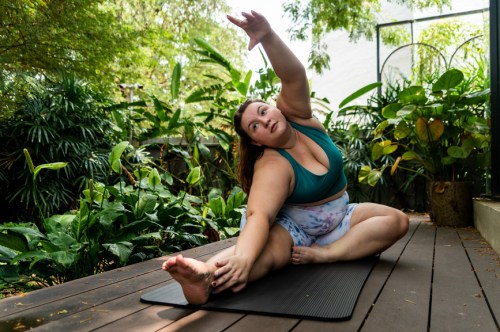How Exercise Benefits Your Bladder—And Can Keep You From Waking Up To Pee at Night
Waking to pee, bladder strength, regular poops—these are just some of the ways that physical activity can benefit you bladder health

Heart health, mental health, and metabolic health are often centered as the primary benefactors of moving your body. However, so many areas of your body benefit from being active, including your bladder, kidneys, and pelvic floor, says Aleece Fosnight, MSPAS, PA-C, CSC-S, CSE, NCMP, IF, a urologist and women’s health specialist of Aeroflow Urology. That’s right—being more active can have a huge impact on the system that helps you go to the bathroom regularly.
Experts in This Article
urology and women’s health specialist at Aeroflow Urology
The relationship between physical activity and bladder health, however, is more of a bigger picture concept than a direct equation, Dr. Fosnight explains. This is largely because of the complexity of the urinary system. When we talk about bladder health, we are also talking about your blood circulation, kidney filtration, pelvic floor function, and bowel health. It also encompasses how frequently you have to go to the bathroom, how you are able to evacuate your bladder and bowels, and if you’re waking up to pee at night.
Bottom line? Physical activity can have an impact on any number of these features of your overall bladder-related wellbeing. “All of these systems have an impact on one another, too,” Dr. Fosnight says. For example, walking can help prevent—or solve—constipation, which is good for your bladder because constipation can cause you to pee more frequently. Here, Dr. Fosnights break down some reasons that physical activity can help your bladder and keep you regular.
1. Physical activity can strengthen the pelvic floor
“Physical activity can improve bladder health by strengthening your pelvic floor muscles that support the bladder and the urethra,” says Dr. Fosnight. She specifically points out that strengthening the core, abdomen, and pelvic region are particularly beneficial to the bladder’s function. “This is because all of these muscles are connected to your pelvic floor, which supports and controls how and when you poop or pee.”
It’s important to note, however, that over-exercising or incorrectly training these areas can have the opposite effect. For example, folks with vaginas can experience pelvic floor tightness from stationary bicycling too much. It’s important to engage in stretching and strengthening, Dr. Fosnight says, but, like everything, in moderation.
2. Staying active prevents constipation
It’s possible you’ve heard that walking after a meal and throughout your day keeps you regular. However, you might not have known that this activity can also help keep your bladder regular. According to Dr. Fosnight, his is because constipation, or backed-up stool in your colon, can put extra pressure on your bladder, which can cause you to pee more often. Basically, keeping number twos regular helps keep number ones in check as well.
3. Physical activity increases blood filtration
Because getting active increases your heart rate, it also has the benefit of sending more blood to your kidneys—and when more blood is sent to your kidneys, more filtration occurs. This helps your body filter and pee out bodily toxins and waste faster.
“Increased blood flow also brings more oxygen-rich blood to vital organs, including the bladder, to keep them happy and healthy,” says Dr. Fosnight. This is why long periods of not moving can have the reverse effect on the body.
4. Exercise especially helps when you’re properly hydrated
“Hydration is key to replacing lost water while sweating during physical activity,” says Dr. Fosnight. “If water replacement doesn’t occur, the waste in your pee becomes more concentrated, which can potentially cause irritation or inflammation. Exercising alongside regular water intake is so great for your bladder and kidneys because they need hydration, too.”
Water helps dilute urine and improves kidney filtration. Drinking at least 60 to 80 ounces of water daily is ideal for optimal urinary system functionality, Dr. Fosnight adds.
5. Stretching and strengthening can improve bladder capacity
Focusing on stretching and strengthening is key when utilizing physical activity to help support your bladder, Dr. Fosnight says. This is especially for those with vulvas; most exercise plans do not focus on the lower core, hips, pelvis, and leg muscles. “If those muscles are not working harmoniously together, this can weaken the opposite muscles causing pain, limited mobility, and ultimately dysfunctionally operating organ systems,” Dr. Fosnight says. Additionally, she stresses that stretching is also important and is often an afterthought. Stretching before and after a workout helps muscles to recover and not stay in a contracted state. Remember, muscles need to be strong but relaxed—not tight.
6. Exercise can help keep you from waking to pee
“Being active during the day helps strengthen the pelvic floor muscles and accessory muscles: your glutes, adductors, abductors, abdominal, and so on,” Dr. Fosnight says. “These muscles continue to support your bladder at night. When you are lying down, they support your bladder and don’t send extra signaling to the brain that there is an urgency to pee.” Additionally, she adds that light sleep is a common culprit behind waking up to pee at night—exercise done at the optimal time of day for your bedtime can help you sleep more deeply and thus wake up to pee less often.
The best news about these tips is that Dr. Fosnight is absolutely not talking about running a marathon or even many miles. In fact, it’s more about breaking up your day with movement than fitting in one challenging period of movement (although that is great, too). Little bits of movement, walks, stretching, cleaning your house, or running errands all count towards moving your body—and bettering your bladder health.
Sign Up for Our Daily Newsletter
Get all the latest in wellness, trends, food, fitness, beauty, and more delivered right to your inbox.
Got it, you've been added to our email list.










